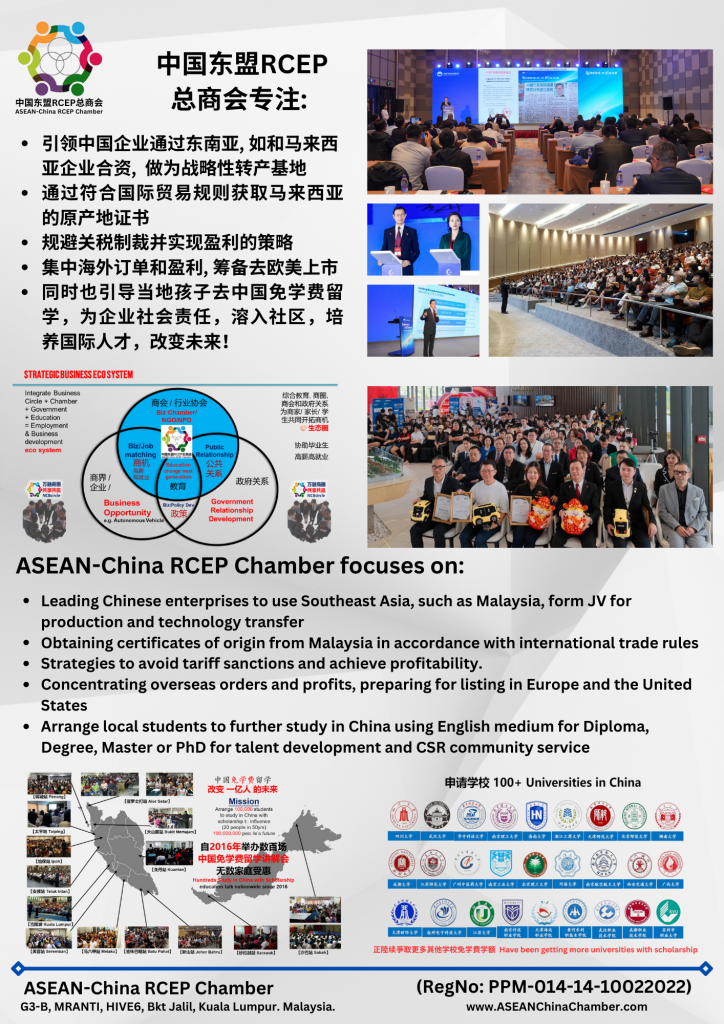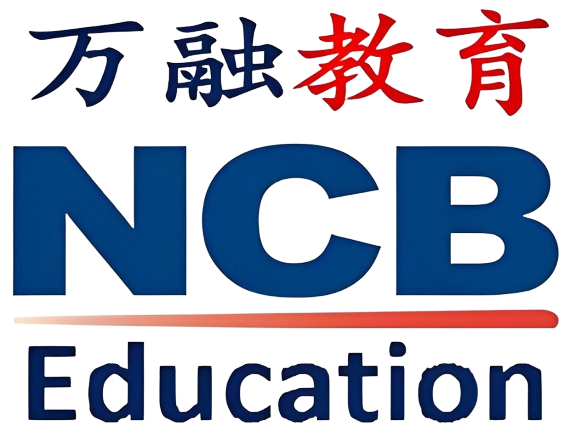About Us
Founding History: In view of the establishment of RCEP, business leaders in China and ASEAN countries recognized the need to have a non-governmental, non-profit and independent business association to promote, develop and enhance mutually-prosperous commercial, cultural and community relations between ASEAN and China businesses and organizations by capitalizing the RCEP framework. ASEAN-China RCEP Chamber (ACRC) was officially registered under Registration of Society (RoS) Malaysia and has been actively engaging its members by providing resources, networking opportunities and support for business community in ASEAN & China.
Objectives: The chamber serves as the voice of its members and business community that have footprints in ASEAN & China region. The ACRC creates value for its members by providing advocacy, business insights, and connections with the objectives to facilitate and support its members in developing and growing their business in a sustainable manner in the region. The ACRC is committed to its objectives by focusing on the following KEY FOCUS AREAS:
- Serves as a platform for discussing and exchanging views on business conditions, both domestic and international, which affect members’ interests in ASEAN and China
- Engage and establish working relationship with government agencies and policy makers in order to express members’ views on trade and related issues for the betterment of business community in the region.
- Provide resources, networking opportunities and support to facilitate trade activities, technology transfer, talent development and ESG best practices within the region.
Sectoral Committee:
- Financial Services: The Committee enables exchange of information on local and regional financial issues through presentations by renown experts and informal/formal networking opportunities.
- Supply Chain & Logistics: The Committee provides opportunities to share information, network, and advocate on issues relevant to the supply chain management and logistics sector. It also addresses industrial development and trade policies in relation to RCEP that have a direct effect on supply chains in ASEAN & China.
- Technology & Media: The Committee provides a platform for interaction and advocacy regarding technology, media, digital and innovation issues.
- Manufacturing & Industrial: The Committee supports and represents the interests of manufacturers and industrial enterprises through informative sessions and networking.
About RCEP
The Regional Comprehensive Economic Partnership (RCEP) Agreement is an agreement to broaden and deepen ASEAN’s engagement with Australia, China, Japan, Korea and New Zealand. Together, these RCEP participating countries account for about 30% of the global GDP and 30% of the world population. The RCEP negotiations commenced in early 2013 and entered into force on 1 January 2022 for ten original parties: Australia, Brunei Darussalam, Cambodia, China, Japan, Laos, New Zealand, Singapore, Thailand and Vietnam. RCEP then entered into force for the Republic of Korea on 1 February 2022, for Malaysia on 18 March 2022 and for Indonesia on 2 January 2023. Once ratified by all initial signatories, RCEP will be the world’s largest free trade agreement by members’ GDP.
The objective of the RCEP Agreement is to establish a modern, comprehensive, high-quality, and mutually beneficial economic partnership that will facilitate the expansion of regional trade and investment and contribute to global economic growth and development. Accordingly, it will bring about market and employment opportunities to businesses and people in the region. The RCEP Agreement will work alongside and support an open, inclusive, and rules-based multilateral trading system.
The scope of the RCEP negotiating areas is comprehensive and include the following:
- Tariff elimination for trade in goods, including the related chapters of rules or origin, customs procedures, sanitary and phytosanitary measures, standards, technical regulations and conformity assessment procedures and trade remedies;
- Liberalization of services sectors, including financial services, telecommunications services and movement of natural persons;
- Promotion, facilitation, protection and liberalization of investment;
- Competition policy (countries are allowed to implement national laws related to state-owned enterprises), intellectual property rights, electronic commerce and government procurement (no market access, only for information exchange and promotion of transparency measures),
- Economic and technical cooperation and SMEs; and
- Legal and institutional issues.
What are the benefits of RCEP?
The major beneficiary of this mega FTA will be ASEAN. Based on World Bank data in 2020, the 15 RCEP Participating Countries (RPCs) account for:
- A total of 29.46% of the global population or 2.3 billion people.
- Combined Gross Domestic Products (GDP) of US$25.9 trillion (RM109.6 trillion) or 30.64% of the world’s GDP.
- Accounts for US$10.09 trillion (RM42.73 trillion) or 28.33% of global merchandise trade.
- The five ASEAN FTA Partners (AFPs) are major investors in ASEAN contributing US$23.7 billion (RM100.37 billion) or 17.26% of the total Foreign Direct Investment (FDI) flow of US$137.3 billion (RM581.45 billion).
RCEP benefits the companies in signing countries by:
- Offering market access to a third of world’s population where intra-regional sourcing of raw materials at competitive price,
- Integrating supply chain within the RCEP region,
- Promoting greater transparency, information sharing, trade facilitation, economic cooperation, standardization of international rules relating to E-commerce,
- Mutually recognizing international standards, technical regulations trade, and
- Providing clarity in protection of intellectual property rights.
Membership
Access
Involvement in Chamber activities provides rare access to top business leaders, key Government agencies, officials in ASEAN and China
Business Networking
The Chamber provides the members with access to the latest business information and an avenue to develop good business contacts locally and internationally.
Dialogue
The Chamber regularly expresses the voice of our members and business community to Government or policy makers on issues related to trade and industry. This provides opportunities for members’ views and concerns to be heard.
Information & Consultancy
The Chamber, through its Sectoral Committees, provides extensive business information service to its members. Direct consultancy is also available on major issues. The Chamber organizes regular dialogues/events to keep members abreast with changes in local/international policies, regulations as well as trade incentives.
Membership Category
- Corporate
- Individual
Click the link below to join us and we will get in touch with you
https://forms.gle/54xd9JkjXkwg2Toq6

Events
Upcoming Event

Date: 13 July 2024 (Sat)
Time: 1pm – 6pm
Venue:
IDCC Ideal Convention Centre Shah Alam
Level 7, Jalan Pahat L 15/L, Seksyen 15, 40200 Shah Alam, Selangor

